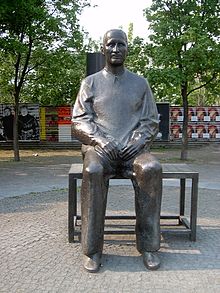- Sandbox for the article on Bertolt Brecht
Cold War and final years in East Germany (1945–1956)

In the years of the Cold War and " red scare", the House Un-American Activities Committee called Brecht to account for his communist allegiances, and he was soon blacklisted by movie studio bosses. Brecht, along with about 41 other Hollywood writers, directors, actors and producers, was subpoenaed to appear before the HUAC in September 1947.
Initially, Brecht was one of 19 witnesses who declared that they would refuse to testify about their political affiliations. Eleven members of this group were actually questioned on this point but, as Brecht later explained, he did not want to delay a planned trip to Europe, so he followed the advice of attorneys and broke with his earlier avowal. On 30 October 1947, he appeared before the committee and testified that he had never actually held party membership. [1]
During his appearance before the committee, Brecht wore overalls and smoked an acrid cigar that made some of the committee members feel slightly ill. He made wry jokes throughout the proceedings, punctuating his inability to speak English well with continuous references to the translators present, who transformed his German statements into English ones unintelligible to himself.
Brecht's decision to testify led to criticism, including accusations of betrayal. The remaining witnesses, the so called Hollywood Ten, refused to testify and were cited for contempt. HUAC Vice Chairman Karl Mundt thanked Brecht for cooperating. The day after his testimony, on 31 October, Brecht flew to Europe. [2]
In Switzerland, Brecht composed an adaptation of Sophocles' Antigone, which was performed at Chur. It was based on the translation by Hölderlin, but was considerably modified. It was published under the title Antigonemodell 1948, accompanied by an essay on the importance of creating a 'non-Aristotelian' form of theatre. He was subsequently invited to return to Berlin by the Communist regime in East Germany. Horrified at the reinstatement of former Nazis into West Germany's government, Brecht accepted the offer and made East Berlin his home in 1949. He was enticed by the offer of his own theatre (completed in 1954) and theatre company (the Berliner Ensemble). He retained his Austrian nationality (granted in 1950), however, and overseas bank accounts from which he received valuable hard currency remittances. The copyrights on his writings were held by a Swiss company. [3] He used to drive around East Berlin in a pre-war DKW car—a rare luxury in the austere divided capital.
While Brecht's communist sympathies were a bane in the United States, East German officials sought to make him their hero. Though he had not been a member of the Communist Party, he had been deeply schooled in Marxism by the dissident communist Karl Korsch, and his communist allegiances were sincere. He claimed communism appeared to be the only reliable antidote to militarist fascism and spoke out against the remilitarization of the West and the division of Germany. Brecht used Korsch's version of the Marxist dialectic in both his aesthetic theory and practice in a central way when presenting his plays.

Brecht wrote very few plays in his last years in East Berlin, none of them as famous as his previous works. Instead, he dedicated himself to directing plays and developing the talents of the next generation of young directors and dramaturges, such as Manfred Wekwerth, Benno Besson and Carl Weber. Some of his most famous poems, however, including the "Buckower Elegies", came from this era. One of the poems in the "Buckower Elegies," Die Lösung (The Solution) was Brecht's later commentary on the uprising of 17 June 1953 in East Germany:
- After the uprising of the 17th of June
- The Secretary of the Writers Union
- Had leaflets distributed in the Stalinallee
- Stating that the people
- Had thrown away the confidence of the government
- And could win it back only
- By redoubled efforts. Would it not be easier
- In that case for the government
- To dissolve the people
- And elect another?
Brecht had previously supported the measures taken by the East German government to crush the uprising, including the use of Soviet military force; he even wrote a letter on the day of the uprising (17 June) to SED First Secretary Walter Ulbricht stating that, "History will pay its respects to the revolutionary impatience of the Socialist Unity Party of Germany. The great discussion [exchange] with the masses about the speed of socialist construction will lead to a viewing and safeguarding of the socialist achievements. At this moment I must assure you of my allegiance to the Socialist Unity Party of Germany". [4]
Notes
-
^ Cite error: The named reference
Excerpt from the HUAC hearing of Brechtwas invoked but never defined (see the help page). - ^ http://www.usc.edu/isd/archives/arc/libraries/feuchtwanger/exhibits/Brecht/HUAC.html
- ^ GradeSaver: ClassicNote: Biography of Bertolt Brecht
- ^ Neues Deutschland, 21 June 1953.]